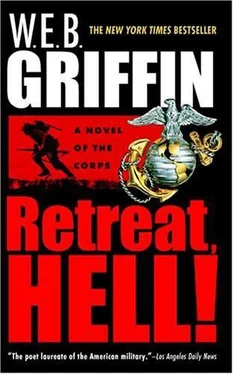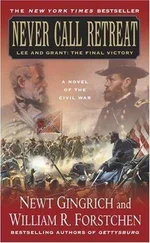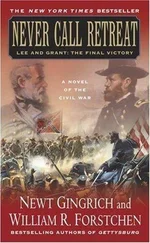"I didn't hear any of this in Tokyo," Pickering said, more than a little bitterly.
"Did you talk to MacArthur?" Howe asked.
Pickering shook his head no.
"Almond told me he got his orders via officer courier," Howe went on. "They're probably known only to the Bataan Gang in the Dai Ichi Building, and they wouldn't tell you unless MacArthur specifically ordered them to. . . ."
"And I didn't ask," Pickering said. "They wouldn't have lied to me if I asked, but I didn't ask."
"Okay. Well, that's it," Howe said. "That's all I know."
"Sir, in these circumstances," McCoy said, "our obvious priority is to get as early a warning of the Chinese intervention as possible, especially since no one else thinks it will happen."
"I think General Almond does," Howe said. "He didn't come right out and say so, but I had the feeling he won't be terribly surprised to encounter the Chinese Red Army."
"How do you propose to get 'as early a warning as possible'?" Pickering asked.
"Well, that opens a new can of worms," McCoy said.
"Let's have it," Pickering said.
"Well, while Colonel Van and I were looking for General Dean and Pick— "
"One final question about that," Howe interrupted. "What about General Dean? I know the President will ask."
"I'm afraid all indications are that he's in China, sir," Vandenburg said.
"Okay. You did your best, and I'll make sure the President knows that," Howe said. "Go on, McCoy. Sorry for the interruption."
"When we were looking for the General and Pick, we also trained the men—the Marines we have on loan—as overnight stay-behinds. By that I mean, we dropped them off and went back the next day and got them."
"Using the Sikorsky helicopters, you mean?" Pickering asked.
"Yes, sir.”
"And using—what was the term you used—'overnight stay-behinds'?"
"That's my term, sir. It's not in any book."
"Very little of anything you've ever done since I've known you has been in any book," Pickering said.
"What they do, General," Vandenburg said, "is find someplace where they won't be seen—where nobody would expect them to be—and then they just listen. The last thing they want to do is get in a firefight. There's no way they could win."
"How do you know where to put them?" Pickering said.
"We fly over in the daytime in one of the L-19s," McCoy said. "Zimmerman or I go along in the backseat. We point out to the pilot where we would like to leave them—usually on some hilltop—and the pilot—who will fly the Big Black Bird—decides if he can go in there or not."
"You're landing helicopters on mountaintops?" Pickering demanded of Major Alex Donald.
"Most of the time we just hover, sir," Donald said. "A couple of feet off the ground. There's no place to touch the wheels down."
"You've been making these flights?" Pickering asked.
"Most of them," McCoy answered for him.
"And this works?"
"Not all the time. But it's all we've got," McCoy said.
"Did you know about this?" Pickering asked Howe.
Howe shook his head no. "This is not my area of expertise," he said.
"What did you mean, Ken, when you said 'a new can of worms'?" Pickering asked.
"Well, sir, when we did it north of the line, Zimmerman and I and some of the original Marines from the Flying Fish Channel operation, plus, of course, our Koreans, did it. We never did it with the Marines we borrowed from the 5th Marines."
"Why not?"
"Our Marines are volunteers, sir. The guys we borrowed from the 5th Marines didn't volunteer for anything. I don't think we should send people to do something like this if they're not volunteers."
"Why not?" Howe said. "I don't remember anybody saying 'volunteers take one step forward' when the 5th Marines were ordered to land at Inchon."
"If our guys are discovered, sir, that's just about it for them. That's not like Inchon. We can't go get them."
"And you don't think they'd volunteer if they were asked?"
"I think they probably would, sir, but . . ."
"But what?"
"We borrowed them, sir. The 5th Marines expect them back. What do we say if we can't return them? That they're missing on a mission we can't talk about?"
"Why not?" Howe asked.
"The Marines don't leave people behind, sir. There would be a lot of questions asked we couldn't answer. But people would keep asking them. Pretty soon, a lot of eyes—angry eyes—would be looking at us, looking damned close at us, and we just can't afford that."
"There wouldn't be that problem, would there, if the men from the 5th Marines were no longer assigned to the 5th Marines?" Howe asked.
"What are you thinking, Ralph?" Pickering asked.
"I think McCoy should go to Socho-Ri, explain what he wants these guys to do, explain why they can only do it if they're in the CIA, ask if anyone wants to be in the CIA, and send the names of those that do to Tokyo. Between you and me, Fleming, with an Operational Immediate message or two, they can be in the CIA by this time tomorrow."
Pickering happened to glance at Colonel Vandenburg.
"You've been pretty quiet through all this, Colonel," Pickering said.
"Sir, no one's said anything I disagree with," Vandenburg said.
"And you have no suggestion or comment to make?"
"Yes, sir. I suggest you get on the 1700 courier with General Howe, so you can run this transfer to the CIA business through from Tokyo. McCoy's right— we have to get off the dime. Either do this, if these men volunteer, or think of something else. And right now, I can't think of anything else."
"That'll teach you to ask questions, Fleming," General Howe said.
[FIVE]
Emergency Room
U.S. Naval Hospital
San Diego, California
23O5 27 October 195O
(15O5 28 October 195O Socho-Ri Local Time)
"What the hell is this?" Lieutenant Marjorie Wallace, NC, USN, asked of Lieutenant (j.g.) James C. Levell, MC, USNR, pointing out the door,
Lieutenant (j.g.) Levell was the medical officer on duty in the emergency room, and Lieutenant Wallace the nurse in charge. They were in a small glass-walled cubicle savoring a rare moment of respite from their late-evening emergency room duties.
A Packard limousine had stopped outside the emergency room. A civilian couple—a tall, slim, silver-haired woman in her fifties, and a portly, dignified, somewhat jowly man who looked about ten years older—were marching purposefully into the emergency room entrance lobby.
"I've seen him before, somewhere," Lieutenant (j.g.) Levell said, adding, "Let the Corpsman handle it."
The Corpsman with the responsibility of dealing with whatever came through the emergency room door proved unable to handle it. Ninety seconds later, he came into the glass-walled cubicle where Dr. Levell and Nurse Wallace were.
"Sir," the Corpsman said, "there's a civilian—two civilians . . ."
"I saw them. What's up?"
"They want to see whoever's in charge, sir," the Corpsman said.
"Now what?" Dr. Levell said, stubbed out his cigarette, pushed himself off the desk, and walked out of the glass-walled cubicle.
He walked up to the couple— I know this guy from somewhere —and smiled at them.
"May I help you, sir?"
"We're here to see one of your patients," the man said, and added an explanation that was more of an accusation. "There's no one answering the door at the main entrance."
"Well, sir, the main entrance closes after visiting hours, which are over at nine, I'm afraid."
"Lieutenant, I think the best way to get this over with quickly would be for you to get the hospital commander on the line."
"I'm not sure I follow you, sir," Dr. Levell said, "but I'd like to suggest that you come back at nine tomorrow morning, when visiting hours begin. There's just no way—"
Читать дальше












